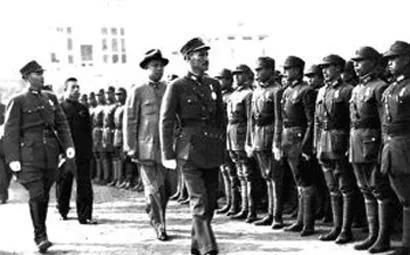In the last years of the Qing Dynasty, the Qing government was corrupt and incompetent, the country was in ruins, and Dr. Sun Yat-sen overthrew the feudal dynasty and established the Republic of China, but the emergence of Yuan Shikai pulled China into a chaotic warlord melee. Even though his rule was soon overthrown, after Yuan Shikai's beginnings, warlords everywhere followed suit, and mercenaries respected themselves. At that time, the Republic of China was very similar to the chaotic period before the establishment of the Three Kingdoms, and all kinds of forces were pulling together development, and no one knew what the future direction and development were.

It was not until the emergence of Chiang Kai-shek that China had a basic order. He was not the most valued disciple of Dr. Sun Yat-sen, but Chiang Kai-shek had a very unique insight into the management of the army, and he was also a high-ranking political official with actual military power within the Kuomintang. If it is said that the warlords in various places are like local forces that have rebelled, then he is the orthodox heir with the "royal bloodline", and after he has the largest military power in the Kuomintang, the Republic of China government has taken his lead, the Whampoa Military Academy has also given him a huge army system, and his troops have also become the central army of the Eight Classics, and if the local warlords do not want to be explicitly targeted, they can only pretend to submit to Chiang Kai-shek's arrangements and command.
At that time, Chiang Kai-shek could be described as having unlimited scenery, but any politician would have great ambitions, and the old Chiang Kai-shek vainly tried to take the whole of China into his own hands, and did not allow other party forces to appear. The most crucial thing is that his control over the troops is more profitable and cannot be completely constrained by laws and regulations, which has led to the emergence of corruption and corruption, which is also the reason for the subsequent defeat of the Kuomintang soldiers.
At the end of the Liberation War, the Kuomintang was gone, Chiang Kai-shek felt that he could no longer hold on to stubborn resistance, in order to save his last bit of strength and wealth, he fled to Taiwan with most of the Kuomintang officers and elite troops, where he became the "King of the Mountains" and dominated the side. However, in fact, before leaving, Chiang Kai-shek had two other places to choose from, so why did he finally choose Taiwan?
When Chiang Kai-shek summoned his subordinates to discuss the retreat, Hu Zongnan first proposed Xikang Province. At that time, Xikang Province was indeed an excellent choice for retreating and defending, not only the terrain was dangerous, but also the place was remote, easy to defend and difficult to attack, if the Kuomintang defended according to danger, it was completely possible to recharge and recharge, and then make a comeback. Most importantly, there are still 450,000 remaining Kuomintang troops in Xikang Province, which is undoubtedly the greatest help.
However, Chiang Kai-shek immediately rejected Hu Zongnan's proposal, Xikang is good, but it is inevitable that it is too barren, these Kuomintang generals are extravagant and accustomed, and it is inevitable that they will have different intentions in such a difficult place. And even if the generals could tolerate it, the grain of the army would become a problem, and if my People's Liberation Army cut off the supply of food from the outside world, the remnants of the Kuomintang troops would probably cocoon themselves and be trapped to death.
Since Xikang was not able to do so, the subordinates recommended another place, Hainan Island, which is surrounded by the sea. Hainan Island is an island in the sea, there is no land to pass, if you want to attack there, you can only take a boat forward, it is easy to expose the whereabouts. Moreover, at that time, the PLA's naval forces were extremely scarce, and there were almost no warships, so if it was conceived as such, Hainan Island was a good place, and Chiang Kai-shek was also a little moved at first.
However, a university professor in Jiangsu and Zhejiang denied the plan to occupy Hainan Island, because he believed that Hainan Island also had the same problem of land infernality as Xikang, and that it would be a joke for eternity if he was buried here because of food supply and other issues.
The professor then recommended the island of Taiwan to Chiang Kai-shek, and he felt that Taiwan was the best choice. First of all, the products are abundant, the land is fertile, and there is no need to worry about food problems. Secondly, it also has dangerous geographical conditions, which are a few points better than Hainan Island, and most importantly, after Japan's defeat in the war, Taiwan has always been within the sphere of influence of the United States, and if the People's Liberation Army directly occupies it, the United States will be a great obstacle.
After listening to the analysis, Chiang Kai-shek also felt that Taiwan was the best choice, so he took a group of remnants of the Kuomintang troops to Taiwan to spend the rest of his life.